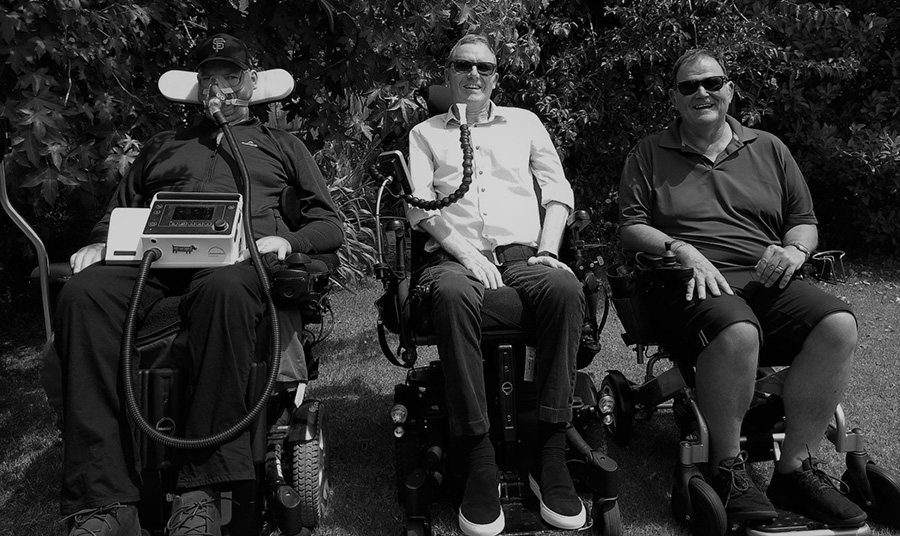Marcus’ Story: “Maybe if we can explain the future, it will help someone create the future”
Last updated: 19 October 2022

You can legally access new medicines, even if they are not approved in your country.
Learn howMarcus was diagnosed with amyotrophic lateral sclerosis (ALS) in 2016. For the past four years he has been committed to raising awareness about the underfunded disease and the path to finding a cure. Marcus is passionate about writing and he just published “Always Losing Something”, a fictional novel based on his own personal experience and tackling the topic of what it might take to cure ALS in 10 years.
We had the pleasure of talking with Marcus about his ALS diagnosis, his latest novel and his hopes for the future. Here’s his story:
On his diagnosis
After experiencing difficulty breathing in 2016, Marcus was diagnosed with ALS in his home country of New Zealand. He was then referred by his friends to the ALS center at the Columbia University in New York where he was prescribed a treatment with Ketas (ibudilast).
Ketas (Ibudilast) is currently approved by the Japan Agency for Pharmaceuticals and Medical Devices (PMDA) for the treatment of bronchial asthma and for cerebrovascular (brain and blood vessel) disorders and has received orphan drug designation for ALS by the FDA (US) and the EMA (EU). The treatment is not currently approved in New Zealand. Treatments for ALS are scarce and many are currently undergoing trials.
Marcus is thankful that his disease is progressing slowly and he is doing the best he can to manage his diagnosis.
“It's always very difficult to tell what impact individual drugs have, but the ibudilast I get from you guys was prescribed by the Columbia team and is hopefully slowing my breathing problems and 5 years is pretty good time for someone with this diagnosis.”
Living with ALS
Marcus is an active contributor to raising funds for ALS research in the US and New Zealand. His investment fund is a major sponsor of the MND New Zealand Association and of the University of Auckland MND research One of their bigger projects revolved around genetic testing of all patients in New Zealand.
“10% of patients have genetic causality so in New Zealand we're 4-500 so there are 40-50 families who share a genetic cause. Before this they didn't know and we’re excited that by identifying that information there may be a first for a cure.”
At the stage of his disease, Marcus has to be careful especially during the current pandemic. His home office is equipped with a mechanical hospital bed, a breathing machine, a voice dictation software and lots of technology. He is cared for by nurses and when he does not have to lock down, he still enjoys a drink at the pub or watching a rugby game with his son. To other ALS patients, Marcus wants them to know that the world is closer to finding a cure in the next ten years rather than the next 20. He also wants them to know that you can still have fun as you go along.
ALS is an underfunded disease
Marcus is committed to raising awareness about how underfunded the research for ALS is. Although there are several initiatives, Marcus finds that no one is “on top of it”.
“Globally we are spending over $13 billion per year caring for over 300,000 patients, and have spent over $10 billion on failed trials in the last 10 years. But investment in general science/university medical schools to discover the actual cause of the disease only gets 1% – 2% of care cost per year (mainly from the US). This investment is also minuscule compared to the global prize of approximately $190 billion from solving this disease. Can we find a new global way where all the countries share a bit of the cost, a bit like corona where everyone is contributing for a vaccine. Can we find a way like that? To get more research done and bring a cure faster. And that's not gonna be next year. It's gonna be much more likely in 2030.”
During the covid-19 lockdown, Marcus had some time to reflect on what it would take to have the right policies that can enable more funding.
“The coronavirus pandemic has made a couple of things very clear to me. First, global health is one of the most important topics of our time, right along with climate change. Second, the leaders of our governments and their health policy can have a massive impact on health outcomes; just contrast how little New Zealand is managing the pandemic compared to the powerful and brutal China, or powerful but distracted USA. The right people in charge with the right policies matter.”
On writing “Always losing something”
“I just like the idea of a happy ending a lot better.”
In 2018 and after his breathing level dropped to 30% while on his last trip to the ALS center at the Columbia University in New York, he started thinking about a novel that tells the story of what is required to cure ALS in the next 10 years.
“I have two close friends with ALS/MND (Greg Horton and Nick Ward in the photo the back of the book), and I was thinking; could the right three guys with ALS/MND (that would need a lot of resources and government connections) create a strategy that would push forward a cure? So the storyline of a billionaire and ex-Prime Minister, along with a regular guy, all diagnosed with ALS/MND, combining to change the world, was born.”
With the progression of his disease, writing the novel was a new hobby he could do from the comfort of his own home after being no longer able to enjoy activities like fishing, running and playing golf. Using a voice dictation software, it took him a couple of years before finishing the book in 2020 while under lockdown. In the book, the protagonist Max Greene uses recent technology advancements that help him manage his disease such as neurolinking and exoskeletons. These are all existing technologies that are available or under development. Marcus hopes that this will raise awareness to the fact that most patients don’t have access to the latest technology as it is not funded by national health programs.
Marcus (who happens to hold a PhD in finance from Cass business School London) is planning two more publications following his novel: a non-fiction book “Dodging Raindrops”, with highly regarded author Paul Little, and an academic article “The Global Economics of MND” with the collaboration of the University of Auckland and the MND New Zealand Association will both come out next year. All three publications examine the questions: Why hasn’t ALS been solved? And what can we do about it? We were very humbled to be featured in his book.
“Patients in New Zealand don't get told that. It's a national health system and cost is important and they don't get told about possible drugs that are available through everyone.org. They're a little bit unproven. I just wanted to raise awareness by putting your name in there that “Hey maybe there's a little more than the national health service provides."
Marcus wants us to stop and think.
“The pandemic has shown health is right up there with climate change - it’s a big issue. So maybe let's try to get our leaders to really think about what we're doing and if all the governments contributed a bit maybe we could put more money in research and get a cure faster.”
If you’d like to read “Always Losing Something”, you can find it on Amazon.
Update 2022
This story was published in November 2020. We are sad to announce that in February 2022, Marcus has passed away. Marcus was a wonderful person who fought hard to support the research of ALS and is survived by his wife, Dr. Amelia Pais-Rodriguez, and sons Marcus, Hugo and Diego Gerbich-Pais.




